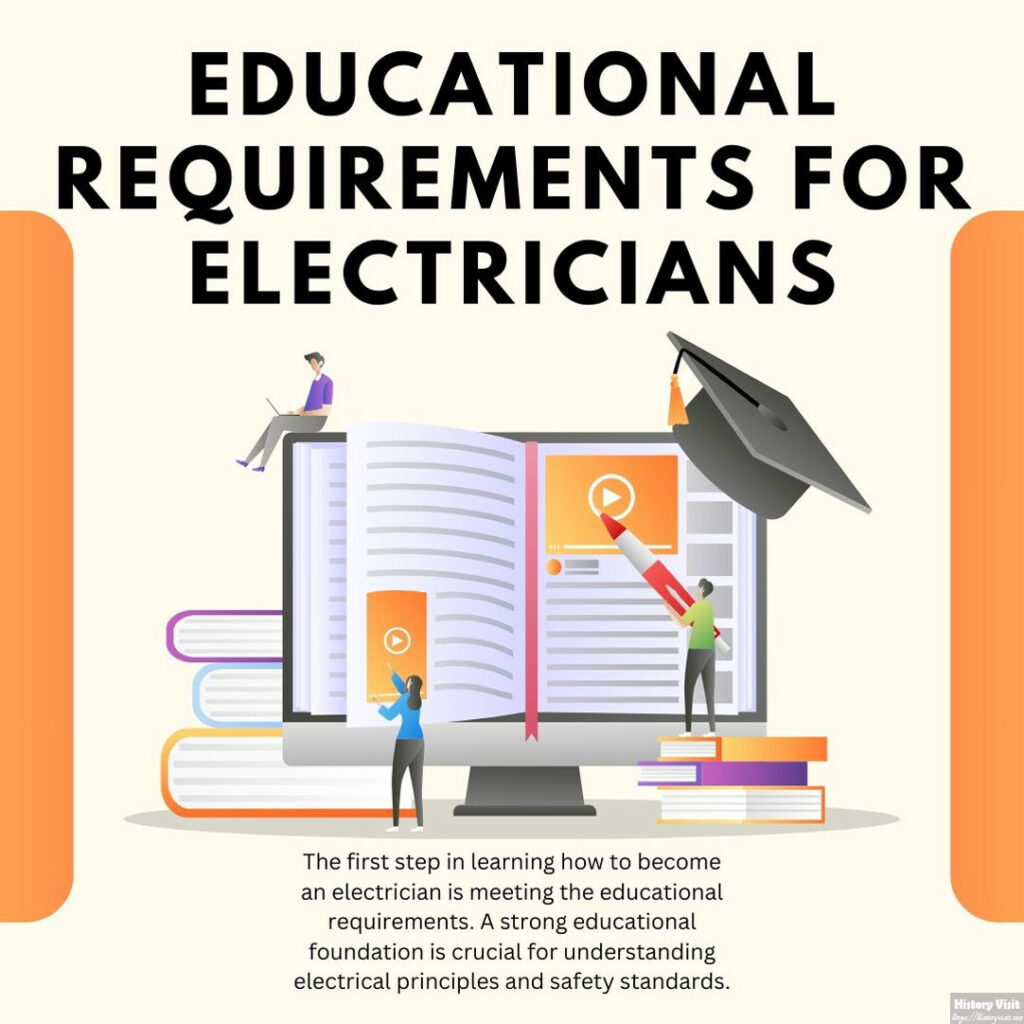How to Become an Electrician

Introduction (How to Become an Electrician)
Learning how to become an electrician can lead to a rewarding and stable career. Electricians are essential professionals responsible for installing, maintaining, and repairing electrical systems. The demand for skilled electricians remains high due to the constant need for electrical services in residential, commercial, and industrial settings. This career offers job security, good pay, and opportunities for advancement.
To become an electrician, you must follow a structured path involving education, training, and certification. Each step in this process is crucial for acquiring the skills and knowledge necessary for the job. Whether you’re just starting or considering a career change, understanding how to become an electrician is essential.
This article will explore the steps involved in becoming an electrician. We’ll discuss the required education, apprenticeship programs, licensing, and career advancement opportunities. By following this guide, you’ll be well on your way to a successful career as an electrician.
Educational Requirements for Electricians

The first step in learning how to become an electrician is meeting the educational requirements. A strong educational foundation is crucial for understanding electrical principles and safety standards.
High School Diploma or GED (How to Become an Electrician)
A high school diploma or GED is typically the minimum educational requirement for aspiring electricians. High school courses in mathematics, physics, and shop classes provide a valuable foundation. These subjects help develop the analytical and technical skills needed in the electrical trade.
Vocational Training Programs
Many aspiring electricians enroll in vocational training programs after high school. These programs, offered by technical schools and community colleges, focus on electrical theory, blueprint reading, and safety practices. Vocational training provides hands-on experience with electrical tools and equipment. Completing a vocational program can enhance your resume and improve your chances of securing an apprenticeship.
Online Courses and Certifications
Online courses and certifications can supplement your education. Many institutions offer online programs covering electrical theory, code standards, and practical skills. These courses provide flexibility for those who need to balance education with other responsibilities. Certifications from recognized organizations can demonstrate your commitment and expertise to potential employers.
Importance of Continuous Learning
The electrical industry constantly evolves with new technologies and standards. Continuous learning is essential for staying current in the field. Many electricians pursue further education and certifications throughout their careers. This commitment to ongoing education ensures you remain knowledgeable and competitive.
Apprenticeship Programs (How to Become an Electrician)

Apprenticeship programs are a crucial step in how to become an electrician. These programs combine hands-on training with classroom instruction, providing comprehensive education.
Finding an Apprenticeship Program (How to Become an Electrician)
To become an electrician, you must complete an apprenticeship program. These programs are typically sponsored by trade unions, contractor associations, or individual employers. Researching and applying to reputable apprenticeship programs is essential. Competitive programs often require passing an aptitude test and an interview.
Hands-On Training
During an apprenticeship, you receive hands-on training under the supervision of experienced electricians. This training involves installing, maintaining, and repairing electrical systems in real-world settings. Hands-on experience is invaluable for developing practical skills and confidence. Apprentices learn to work with various tools, materials, and safety protocols.
Classroom Instruction
Apprenticeship programs also include classroom instruction. This education covers electrical theory, code standards, mathematics, and blueprint reading. Classroom instruction provides the technical knowledge needed to complement hands-on training. Instructors often have extensive industry experience, providing valuable insights and guidance.
Duration and Commitment
Apprenticeship programs typically last four to five years, requiring a significant commitment. During this time, apprentices work full-time and attend classes regularly. Completing an apprenticeship is demanding but essential for becoming a licensed electrician. Graduates of apprenticeship programs are well-prepared for licensing exams and entry-level positions.
Licensing and Certification (How to Become an Electrician)

Licensing and certification are essential steps in how to become an electrician. These credentials demonstrate your qualifications and adherence to industry standards.
State Licensing Requirements (How to Become an Electrician)
Licensing requirements for electricians vary by state. Most states require passing an exam that tests knowledge of electrical theory, code standards, and safety practices. Research your state’s specific requirements to ensure you meet all criteria. Some states also require a certain number of work hours and completion of an apprenticeship program.
Types of Licenses
There are several types of electrical licenses, including journeyman, master electrician, and specialty licenses. A journeyman license is typically the first step after completing an apprenticeship. This license allows you to work independently but under the supervision of a master electrician. A master electrician license requires additional experience and allows you to supervise other electricians and obtain permits. Specialty licenses may be required for specific types of electrical work, such as residential or industrial.
Preparing for the Licensing Exam
Preparing for the licensing exam is crucial for success. Many resources are available, including study guides, practice exams, and review courses. Focus on areas covered by the exam, such as electrical theory, national and local codes, and safety practices. Gaining practical experience during your apprenticeship will also help you pass the exam.
Importance of Certification
In addition to state licenses, obtaining certifications from recognized organizations can enhance your credentials. Certifications demonstrate your expertise in specific areas, such as solar energy or industrial electrical systems. These credentials can improve job prospects and opportunities for advancement.
Career Advancement Opportunities

Understanding how to become an electrician also involves exploring career advancement opportunities. The electrical trade offers various paths for growth and specialization.
Gaining Experience (How to Become an Electrician)
Gaining experience is crucial for career advancement. As you work in the field, seek opportunities to take on more complex projects. Developing a reputation for reliability and expertise can lead to promotions and increased responsibilities.
Becoming a Master Electrician
Becoming a master electrician is a significant milestone. This license allows you to supervise other electricians, obtain permits, and run your own business. Achieving this status requires additional experience, passing a rigorous exam, and often further education. Master electricians typically earn higher salaries and have more job opportunities.
Specialization Areas
Electricians can specialize in various areas, such as residential, commercial, industrial, or renewable energy. Specializing can make you an expert in a specific field, improving job prospects and earning potential. Continuous learning and obtaining relevant certifications are essential for specialization.
Starting Your Own Business
Many experienced electricians choose to start their own businesses. Running an electrical contracting business requires strong technical skills, business acumen, and a commitment to customer service. Successful business owners can enjoy financial independence and control over their work schedules.
Challenges and Rewards of Becoming an Electrician (How to Become an Electrician)

Becoming an electrician involves challenges and rewards. Understanding these aspects helps in preparing for a career in this field.
Physical Demands (How to Become an Electrician)
The work of an electrician is physically demanding. It involves standing for long periods, lifting heavy objects, and working in confined spaces. Physical fitness and stamina are important for performing these tasks safely and effectively.
Safety Risks
Working with electricity involves inherent safety risks. Electricians must follow strict safety protocols to avoid accidents and injuries. Proper training, use of protective equipment, and adherence to safety standards are crucial. Awareness and caution can mitigate most risks.
Job Satisfaction
Despite the challenges, many electricians find their work highly satisfying. Solving electrical problems, working with your hands, and seeing the results of your efforts can be rewarding. The opportunity to help people and businesses by providing essential services adds to job satisfaction.
Financial Stability
Electricians typically enjoy financial stability and good earning potential. The demand for skilled electricians ensures job security. Opportunities for overtime and specialized work can further increase income. Electricians can also pursue additional certifications and specializations to enhance their earning potential.
Conclusion
Learning how to become an electrician involves a structured path of education, training, and certification. Starting with a strong educational foundation is essential for understanding electrical principles. Apprenticeship programs provide invaluable hands-on training and classroom instruction. Obtaining the necessary licenses and certifications ensures you meet industry standards.
Career advancement opportunities in the electrical trade are plentiful. Electricians can gain experience, become master electricians, specialize in specific areas, or start their own businesses. Each step in this journey requires dedication, hard work, and continuous learning.
The challenges of becoming an electrician are balanced by the rewards. Physical demands and safety risks are part of the job, but job satisfaction and financial stability make this a rewarding career. By following the outlined steps, you can successfully navigate the path to becoming an electrician. Embrace the opportunities and challenges, and you’ll find a fulfilling and prosperous career in the electrical trade.


